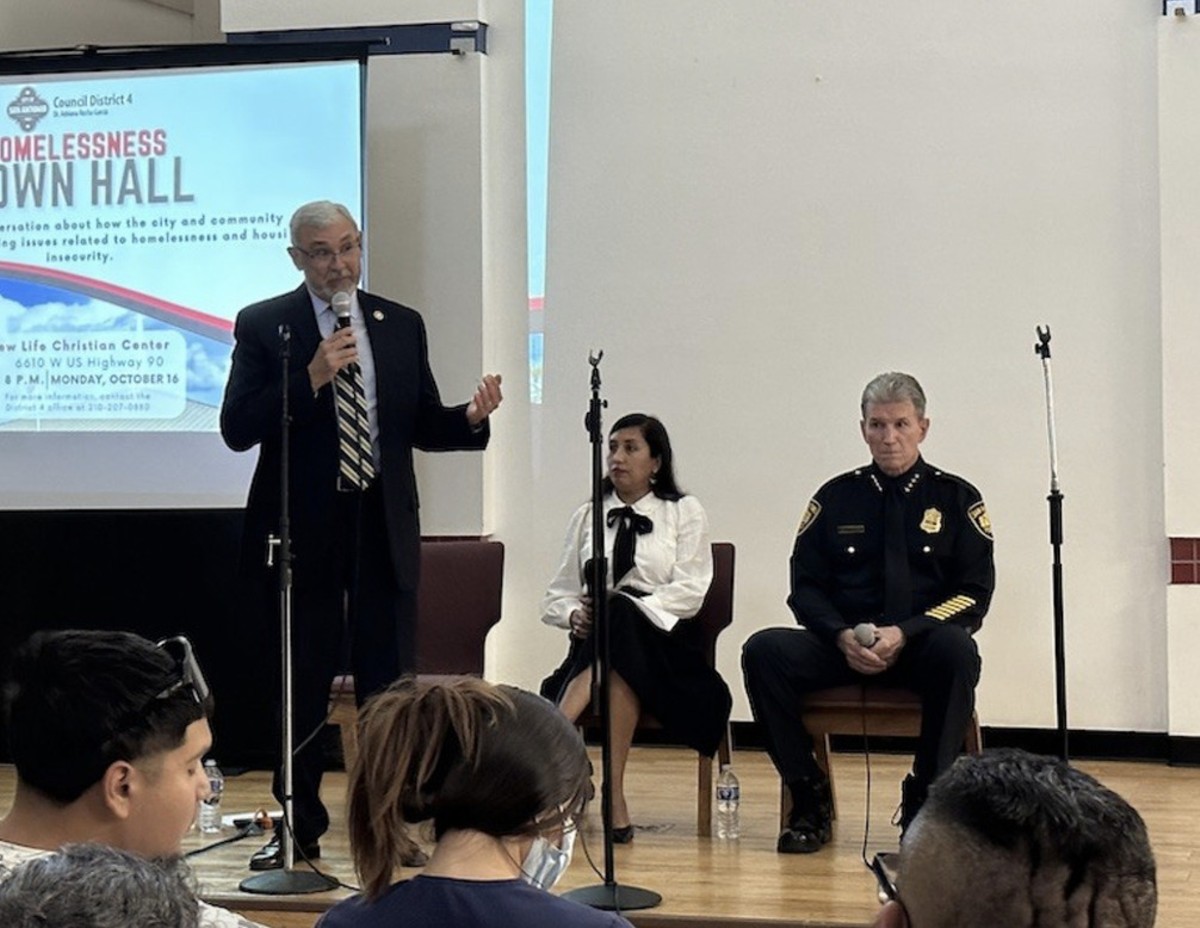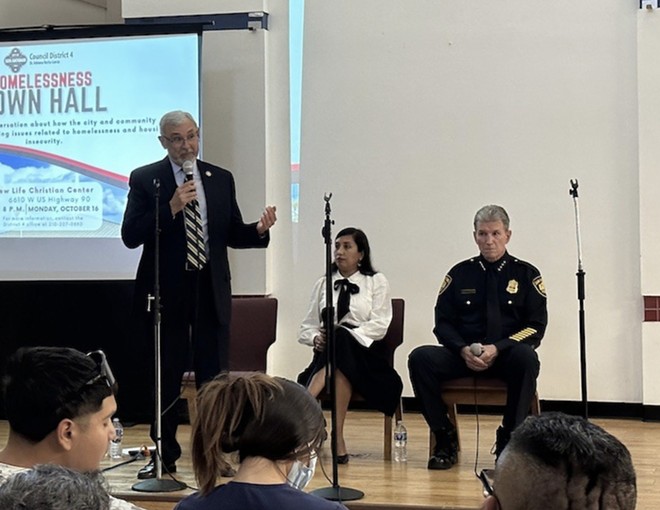Editor’s Note: Bad Takes is a column of opinion and analysis.
Being a cop is a tough job.
Since Aug. 24, five San Antonio peace officers have been shot in the line of duty, and although none died, from what research tells us about the statistical relationship between the prevalence of guns and the harm incurred by law enforcement, we have no right to act shocked when our luck runs out.
“If we’re interested in protecting police officers, we need to look at what’s killing them, and what’s killing them is guns,” David Swedler of the University of Illinois at Chicago School of Public Health said in 2015.
Police are three times more likely to be murdered on the job in high gun ownership states than in those with low levels of gun ownership, Swedler found in his research.
A separate analysis published last year in Preventive Medicine Reports showed that in states without mandated universal background checks, “for every 1% increase in state-level firearm ownership, there was a 12.4% increase in the odds of a firearm assault on a law enforcement officer.”
Not only does Texas not require private sellers to conduct background checks, Gov. Greg Abbott in 2021 signed a law during a ceremony at the Alamo that allows anyone over the age of 18 to openly carry a firearm without a permit, let alone training. Abbott, who was accompanied by NRA chief Wayne La Pierre at the ceremony, signed that bill over the adamant objections of the Texas Police Chiefs Association and sheriffs across the state.
“The recent wave of shootings against SAPD officers should be a wake-up call about the dangerous, lawless environment that Texas Republicans have fostered,” U.S. Rep. Joaquin Castro, D-San Antonio, said following the string of cop shootings here. “Law enforcement officers and the public are paying the price for this recklessness.”
August marked the 49th consecutive month that gun sales nationwide topped 1 million. That’s more than 1 million more guns in America, every single month — for four years. We are the only country in which firearms outnumber the citizenry, and unlike in Japan, Australia, the United Kingdom and free societies elsewhere, commonsense gun licensing is practically a political third rail.
Given their party’s refusal to discuss any kind of gun reform, GOP politicians’ claims to “back the blue” are all hat and no cattle.
Enter U.S. Rep. Tony Gonzales, a Republican representing part of San Antonio and a wide swath of South Texas, including Uvalde. Since he was censured by Texas Republicans over his support for bipartisan gun-control legislation, he’s felt the need to overcompensate with bellicose pandering.
Speaking at a downtown convention for the Combined Law Enforcement Associations of Texas, he declared his intention “to go to war” with Bexar County Distract Attorney Joe Gonzales. The congressman also proposed increasing sentences for those who attack first-responders from 20 years to 25.
But does anyone really think those extra five years will deter a single criminal? We’ve already got 2 million people in prison, more than any other nation on the planet. Can anyone seriously contend that we’re not throwing the book hard enough at lawbreakers?
San Antonio Police Chief William McManus, understandably exasperated over the recent officer shootings, has argued just that.
“Another SAPD officer was shot and hospitalized a few hours ago by a repeat violent offender who should have been in jail,” the chief tweeted on Sept. 5, adding to the chorus of those accusing the District Attorney of being lax in keeping recidivists behind bars.
Let’s get real. It’s highly unlikely that anybody’s first criminal offense will be shooting a cop. That means any such assailant will almost always have an extensive rap sheet which bad-faith critics can point to and ask why the shooter isn’t rotting in prison.
That kind of reasoning by anecdote isn’t serious, and it seldom results in sound public policy. Absent indefinitely detaining everyone who ever ran a red light, the vast majority of prisoners are going to be released eventually. We need to address the root causes of crime instead of playing a desperate game of Whack-a-Mole.
In the wake of the San Antonio shootings, McManus and Gonzales privately gave one another the silent treatment for weeks while bickering through media sound-bites. They have since appeared to make up at a town hall last Tuesday.
Local TV news ate up the bickering, of course, and Gonzales has admitted to getting a bit defensive in his effort to protect the 200 prosecutors who work in his office and together process 50,000 cases annually.
Only two of the five suspects involved in the recent shootings had any violent history, and one of the officers inadvertently shot himself, Gonzales pointed out last week during his appearance on the Express-News podcast Puro Politics.
Gonzales also argued that a bail bond system based on how much money someone has rather than how much of a risk they pose to the community is an affront to public safety.
“So, if somebody who commits a serious offense, like a murder, if his bond is set at $100,000 and he happens to have access to what is typically the percentage, 10%, he can get out posting $10,000, and if a bail-bonds agent is willing to write the bond, sometimes they do it as low as 3%,” he told Express-News editors. “If it’s a family violence situation, that individual can be released and go back to continue to assault the victim.”
Meanwhile, a low-level, nonviolent offender who’s dead-broke can languish in lockup until their court date.
Mending this senseless disparity isn’t something a lowly judge or district attorney can do, and under pressure from the Texas Legislature, Gonzales has already rolled back his modest attempts at bail reform for those caught with cannabis and homeless people charged with trespassing.
That’s why the recently defunded community organization SA2020 supported the failed ballot initiative known as the Justice Charter: to stop wasting taxpayer money by locking up graffiti taggers, petty shoplifters and pot-smokers.
“The Bexar County jail is full,” Bexar County Judge Peter Sakai told reporters in his office Sept. 8, after a week spent avoiding the press.
One solution Sakai intends to discuss as part of a city-county commission set up by he and Mayor Ron Nirenberg is releasing mentally incompetent inmates who may not pose a danger to others. That would free up room for repeat violent offenders.
“We have limited resources, we may have to increase those resources to make sure that the people who are committing violent crimes are kept off the streets,” Sakai said.
However, the judge’s priority last week was passing the nearly $3 billion county budget, over $157 million of which will go to the sheriff’s office alone. And that’s just the county.
The city’s new $621 million police budget is its largest ever.
Yet, when speaking to reporters, Sakai said, “I’ve got to make sure that the DA and the sheriff have the manpower, that they have the resources, that they have everything they need to do to better protect our community.”
To ask an obvious follow-up, if Sakai doesn’t know whether and where the police lack resources until the new city-county commission does its work, why approve a massive budget without first acquiring that knowledge? And why usher another 50 cops into a broken system?
The most sober defense of “defunding the police” came not from a Black Lives Matter protester, but from then-Dallas Police Chief David Brown. His comment came after an Army reservist in 2016 shot and killed five officers and injured nine others in what was the deadliest massacre of law enforcement since 9/11.
“We’re asking cops to do too much in this country. Every societal failure, we put it off on the cops to solve,” Brown said. “Not enough mental health funding, let the cops handle it. Not enough drug addiction funding, let’s give it to the cops. Here in Dallas we’ve got a loose-dogs problem. Let’s have the cops chase loose dogs. Schools fail, give it to the cops. That’s too much to ask. Policing was never meant to solve all those problems. And I would just ask for other parts of our democracy, along with the free press, to help us, and not put that burden all on law enforcement.”
We can’t lay every social ill — from homelessness to mental health to poverty to addiction to animal control — at the feet of police officers. Is it any wonder that half of murders go unsolved?
Capitulating to ever-increasing police budgets, which Abbott has now mandated by law, amounts to defeatism. If we could somehow manage to give cops less to do while encountering fewer firearms on the streets, we’d all sleep more safely.
Subscribe to SA Current newsletters.
Follow us: Apple News | Google News | NewsBreak | Reddit | Instagram | Facebook | Twitter| Or sign up for our RSS Feed


